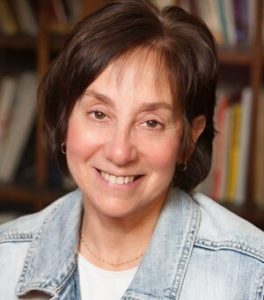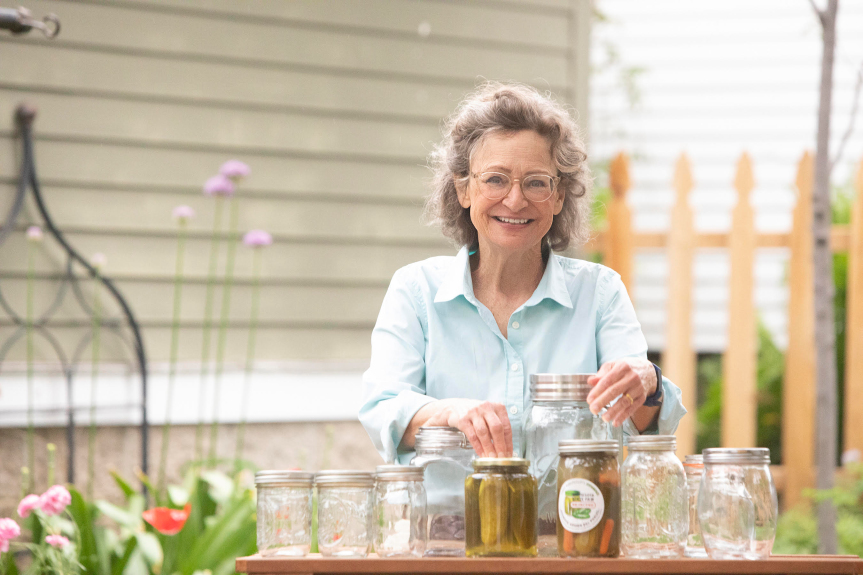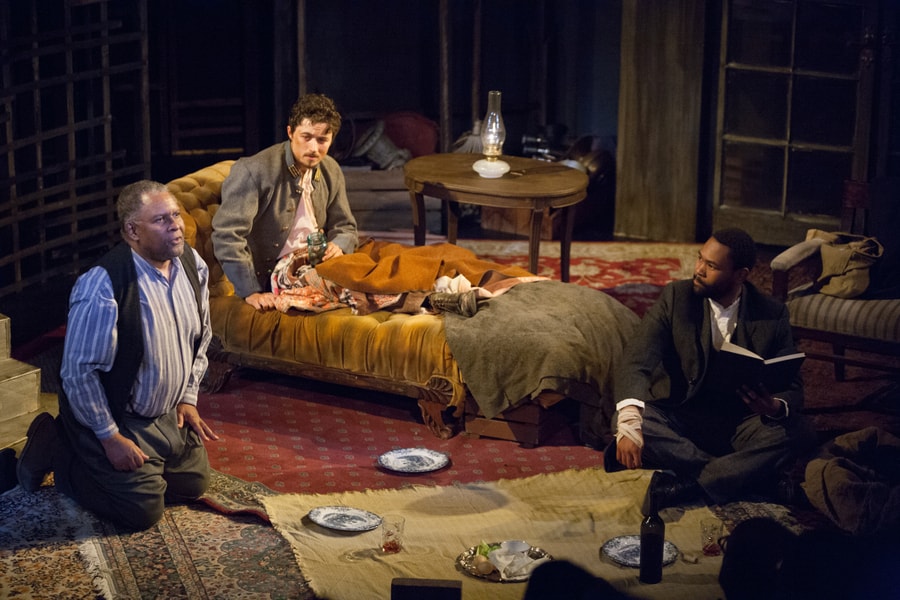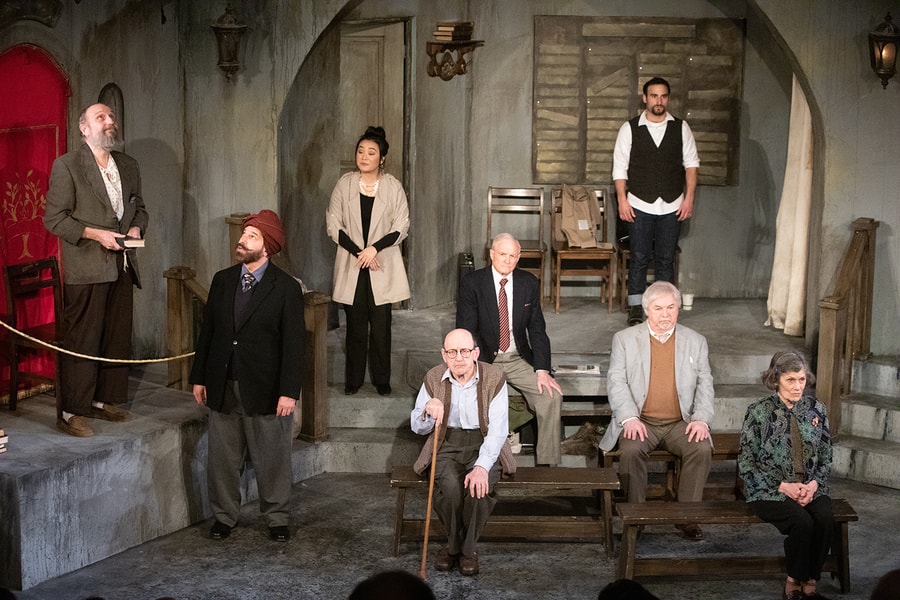ST. PAUL, MINN.: Earlier this summer Minnesota Jewish Theatre Company, which performs in the Highland Park Community Center in St. Paul, announced a new name for the company that nods to the Star of David but reflects an expanded mission: Six Points Theater. As one of the nation’s preeminent theatres rooted in Jewish history and culture, Six Points is now entering its 27th season, having produced more than 90 plays and musicals since its inception.
We spoke with Barbara Brooks, producing artistic director of the now-named Six Points Theater, by email about her theatre as it works to emerge from the pandemic and its deepening commitment to cultural specificity.
AMERICAN THEATRE: Who founded Minnesota Jewish Theatre Company, when, and why?

BARBARA BROOKS: I founded Minnesota Jewish Theatre Company in 1994. I’m originally from New York City and came to Minnesota for grad school in music therapy at the University of Minnesota after receiving a B.A. in music from Vassar College. I decided on music therapy as a field to support myself while pursuing light opera.
Once adjusted to Minnesota, I recognized there was quite a difference in the way New York City and Minnesota felt as communities with people of many cultures and backgrounds, especially with regard to noticeable racism and isolation.
I received my M.A., worked for the St. Paul Public Schools for eight years, performed in musicals and plays in the Midwest and on the East Coast, and gave birth to my son, and kept thinking about identity and how theatre could foster Jewish continuity, provide opportunities for non-Jews to learn about Jewish history and culture, and increase understanding and tolerance. I knew of other culturally specific Jewish theatres in New York City, San Francisco, and other cities, and felt the Twin Cities might be ripe, and thus founded Minnesota Jewish Theatre Company (MJTC).
The theatre has grown organically from producing two plays a year to a season of five shows a year, plus new-play development. We commissioned a holiday production when expanding from two to three shows, and this was the seed for the new-play development program, Wellsprings. In 2002, Doorways was introduced as an initiative of events and activities that complement the work onstage. The Hanukkah holiday production is the only show in Minnesota about the Jewish holiday.
Over three years ago, the theatre began to consider a name change. Extensive conversations with audiences, artists, donors, and staff led the board of directors and myself to embrace the name Six Points Theater—a name that remains true to our mission, and also acknowledges our evolution as an organization and our dreams for the future.
What are the unique challenges of producing theatre in St. Paul?
There is a lot of theatre per capita in the Twin Cities of Minneapolis/St. Paul, and we try to have our marketing and communications keep front and center about who we are so that people who may be interested in the work we do get to know us.
Tell us about your favorite theatre institution other than your own, and why you admire it.
I admire Penumbra Theatre immensely. They remain true to their mission with work that is bold and of high artistic standards. Like their philosophy as I understand it, we also believe that the work must remain true to a cultural community, and it begins with the playwright. How we cast, for example, remains true to the text and intentions of the playwright.
How do you pick the plays you put on your stage?
All the work we do is contemporary. We want to bring new work to our audiences, so with the exception of a handful of pieces, everything has been a regional premiere or a world premiere (nearly 100 productions). We have a small, intimate house (149 at full capacity; right now, as we go back into the theatre, we’re only seating 55 per performance), and I keep abreast of plays finishing runs Off-Broadway. We also receive scripts from playwrights and agents from both coasts and have relationships with other producers (such as Daryl Roth) and theatres with whom we network. We’ve commissioned four shows to date and produced nine world premieres.

What’s your annual budget, and how many artists do you employ each season?
Our annual budget is $435,500. We typically produce shows with a cast size of two to five. We’ve produced a lot of solo shows as well, including Rose by Martin Sherman, Dai (enough) by Iris Bahr, Woman Before a Glass by Lanie Robertson, 2.5 Minute Ride by Lisa Kron, and A Pickle by Deborah Yarchun. Our typical production team has a director, designers, a technical director, tech assistance, and more.
How did your theatre adapt to the past 18 months of COVID-19, and what does the prognosis look like?
We had to cancel our spring 2020 show, The People’s Violin by Charles Varon, which is now in rehearsal to open in the theatre Oct. 23. We immediately began to do one-on-one interviews with artists, and these were recorded and made available on our website. We produced a 2020-21 season that had strict COVID-19 safety protocols for our artists and audiences. This included a summer two-person piece, 25 Questions for a Jewish Mother by Kate Moira Ryan and Judy Gold, that played in large backyards and public venues in the Twin Cities; a solo show, Operation: Immigration, by Avi Aharoni, about his father, an Iranian Jew, that we filmed outdoors and played online as a pay-per-view in a schedule similar to a regular run; and a winter show, Promise of America: A Celebration of Jewish American Song conceptualized by myself and Kevin Dutcher, that we filmed and was also pay-per-view, that looked at Jewish American songwriters of the 20th century, spanning Tin Pan Alley, Broadway, pop, and rock, and included a song by the African American Orthodox Jewish rapper Nissim Black.
We ended the season with A Pickle, a solo show, back to outdoors in backyards and public venues. This season we began in August outdoors, and are going into the theatre for our fall, holiday, winter, and spring shows, with COVID-19 protocols including proof of vaccination, mandatory masks, and seating at about one third capacity.
How has your theatre responded to calls for racial justice and more equitable working conditions put forward in documents like We See You, White American Theatre, among others?
The board brought in a consultant to begin work on fostering increased diversity and equity. As a very mission-driven organization with the bedrock of work within a particular culture, we’re striving to increase diversity as we can within the framework. This includes reflecting diversity of Jewish identity ,such as with the play Two Jews Walk Into a War… by Seth Rozin, about Jews in Afghanistan, as well as intentionality for hiring of production team and staff.

What show are you working on now? Anything else in your season that you’re especially looking forward to?
We’re in rehearsal for The People’s Violin for our fall show. Our holiday show, Chanukah in the Dark, is a new commission written by Hayley Finn, who also wrote the lyrics, with music by Adam Wernick, that will be receiving its world premiere in December. Our winter production is a New Play Reading Festival that we’re doing for the first time, with Robert Dorfman as festival director. Three new plays not yet previously seen will be presented onstage, allowing audiences to experience cutting-edge work and Six Points Theater to broaden the landscape of Jewish theatre.
Strangest or funniest thing you’ve ever seen (or put) on your stage?
For our production of Jericho by Jack Canfora, we needed a major scene shift into a Long Island home’s dining room. With our typical budget constraints, a manual turntable was built, and the shift was choreographed and timed perfectly to music, and accomplished by all the actors, who then got into place exactly in time. It was really quite beautifully accomplished and very memorable.
What are you doing when you’re not doing theatre?
I love to travel, enjoy working out and being physically active, and I’ve tried in the last year to carve out time to read books not related to theatre. I enjoy a good movie and just plain relaxing at home.
What does theatre—not just your theatre, but the American or world theatre—look like in, say, 20 years?
Recent events—the pandemic, killing of George Floyd, the Jan. 6 attack at the Capitol, and the ongoing assault on our democracy and societal norms—will have an impact. I think use of technology (Zoom, streaming, etc.) will be incorporated for programming and accessibility in ways we’re not even yet aware. And I hope theatre will expand with voices and stories that bring the multitudes of realities in our world to the stage.
Creative credits for production photos: Shul, by Sheldon Wolf, with direction by Robert Dorfman, scenic design by Michael Hoover, costume design by Rebecca Bernstein, lighting design by Paul Epton, sound design by C. Andrew Mayer, props design by Rick Polenek, dramaturgy by Jo Holcomb, and stage management by Katie Sondrol, with Teresa Nelson serving as technical director. The Whipping Man, by Matthew Lopez, with direction by Sally Wingert, scenic design by Michael Hoover, costume design by Andrea Gross, lighting design by Paul Epton, sound design by Anita Kelling, props design by Rick Polenek, stage management by Jorge Rodriguez-Sosa, and special make up by Paran Kashani, with Dietr Poppen serving as technical director.


